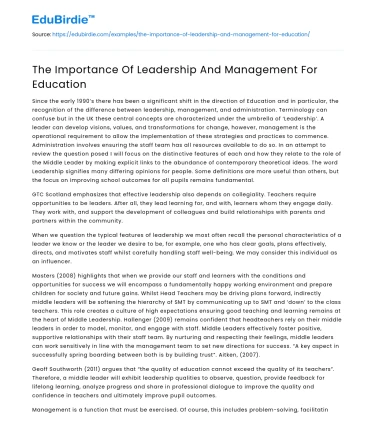Since the early 1990’s there has been a significant shift in the direction of Education and in particular, the recognition of the difference between leadership, management, and administration. Terminology can confuse but in the UK these central concepts are characterized under the umbrella of ‘Leadership’. A leader can develop visions, values, and transformations for change, however, management is the operational requirement to allow the implementation of these strategies and practices to commence. Administration involves ensuring the staff team has all resources available to do so. In an attempt to review the question posed I will focus on the distinctive features of each and how they relate to the role of the Middle Leader by making explicit links to the abundance of contemporary theoretical ideas. The word Leadership signifies many differing opinions for people. Some definitions are more useful than others, but the focus on improving school outcomes for all pupils remains fundamental.
GTC Scotland emphasizes that effective leadership also depends on collegiality. Teachers require opportunities to be leaders. After all, they lead learning for, and with, learners whom they engage daily. They work with, and support the development of colleagues and build relationships with parents and partners within the community.
Save your time!
We can take care of your essay
- Proper editing and formatting
- Free revision, title page, and bibliography
- Flexible prices and money-back guarantee
When we question the typical features of leadership we most often recall the personal characteristics of a leader we know or the leader we desire to be, for example, one who has clear goals, plans effectively, directs, and motivates staff whilst carefully handling staff well-being. We may consider this individual as an influencer.
Masters (2008) highlights that when we provide our staff and learners with the conditions and opportunities for success we will encompass a fundamentally happy working environment and prepare children for society and future gains. Whilst Head Teachers may be driving plans forward, indirectly middle leaders will be softening the hierarchy of SMT by communicating up to SMT and ‘down’ to the class teachers. This role creates a culture of high expectations ensuring good teaching and learning remains at the heart of Middle Leadership. Hallenger (2009) remains confident that headteachers rely on their middle leaders in order to model, monitor, and engage with staff. Middle Leaders effectively foster positive, supportive relationships with their staff team. By nurturing and respecting their feelings, middle leaders can work sensitively in line with the management team to set new directions for success. “A key aspect in successfully spring boarding between both is by building trust”. Aitken, (2007).
Geoff Southworth (2011) argues that “the quality of education cannot exceed the quality of its teachers”. Therefore, a middle leader will exhibit leadership qualities to observe, question, provide feedback for lifelong learning, analyze progress and share in professional dialogue to improve the quality and confidence in teachers and ultimately improve pupil outcomes.
Management is a function that must be exercised. Of course, this includes problem-solving, facilitating meetings, as well as the traditional bureaucratic tasks but leadership is a relationship established over time. When management skills and leadership overlap we create time and opportunities for colleagues to meet, visit one another's classrooms, lead discussions, plan new topics, and so on. All of these are important opportunities for professional collaboration. The middle leader can chair these discussion groups by encouraging teamwork and ensuring that time is used to consider the pedagogic and practical changes needed in their classrooms. As much of educational leadership moves away from the use of ‘management’ terminology, as Southworth (2009) points out, through our understanding of management we now have a systematic approach to leadership development.
So far this review has addressed the features of leadership and management and where these fit into the role of middle leaders but let us now clarify its relationship with the administration. When we consider the meaning of administrative tasks within education we think of forwarding plans, timetables, risk assessments, and so forth. Typically, the distinctive responsibilities within schools are held by all staff and can have crucial implications if not completed, for example, failing to take a class register then having a fire drill or a pupil goes missing however there is no official record of them arriving in school that morning. The completions of these administrative tasks allow the system to function in a methodical and orderly way.
In summary, I have sought to articulate the distinctive features of educational management and leadership. In essence, administration tasks entail being assigned and carrying out a set of particular responsibilities that vary from the top down for the proper functioning of a system. This evaluation also addresses how these responsibilities fit within the role of a middle leader. It also compares leadership with the responsibilities of a manager; where the operational requirements are embedded to allow the implementation of these strategies and practices to commence. Whelan (2009) states ‘A school system can have excellent people, leaders, standards, and structures, but unless its teachers have the knowledge and skills to help every child to learn, it will never perform well. In essence, Middle leaders are those working in leadership roles between senior leaders and teachers, and who have significant roles and responsibilities to fulfill within a thriving team.






 Stuck on your essay?
Stuck on your essay?

